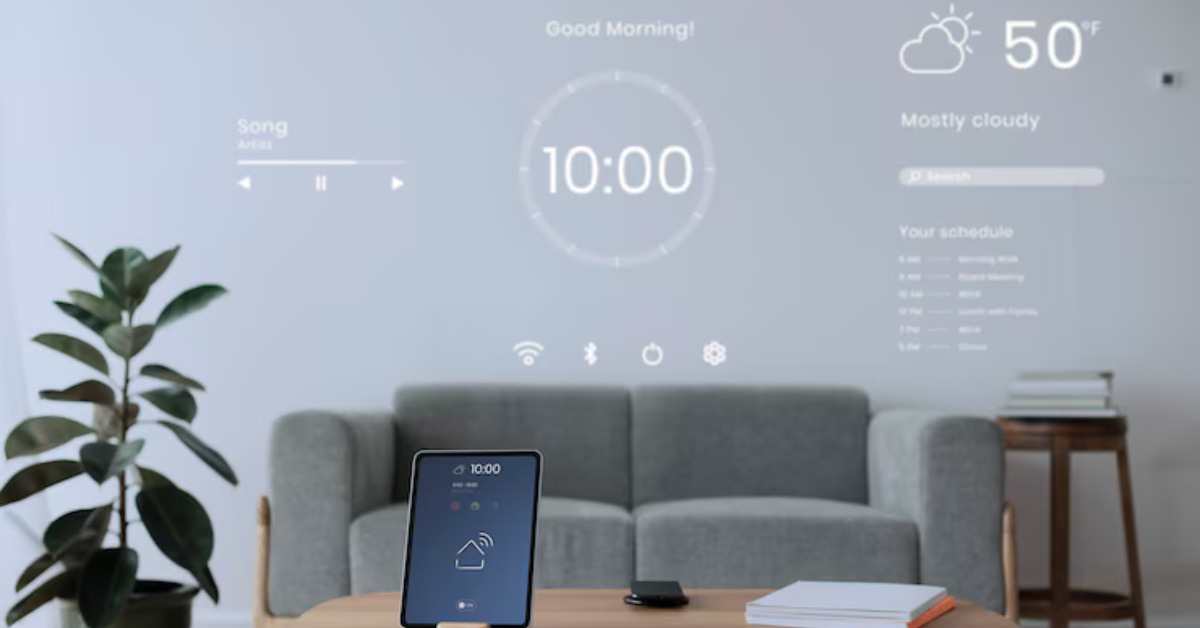The idea of home has undergone a transformation in recent years. What was once a simple living space has evolved into a dynamic, intelligent environment capable of responding to our commands, anticipating needs, and maximizing comfort. Smart homes using AI in India are opening up new possibilities by blending cutting-edge technology with daily life, reshaping how people live, work, and interact with their homes.
With increasing urbanization, growing disposable incomes, and enhanced internet connectivity, the Indian market is embracing artificial intelligence in home automation more rapidly than ever. This article dives into the emerging world of smart homes in India, exploring the technologies behind them, the benefits they offer, and how they are redefining the concept of modern living.
The Rise of Smart Living in India
India’s smart home ecosystem is expanding steadily, driven by consumer demand for convenience, energy efficiency, and security. Traditionally, home automation was associated with high-end luxury homes, but AI-powered devices have now made the concept more accessible to middle-income households.
Factors Driving Growth in India:
- Increase in internet penetration, particularly in Tier 2 and Tier 3 cities
- Growing tech-savvy middle class
- Declining costs of smart devices
- Government initiatives like Digital India and Smart Cities Mission
- Homegrown AI startups providing affordable, localized solutions
According to Statista, the Indian smart home market is expected to reach over USD 7 billion by 2028, with millions of homes integrating AI-powered systems.
What Makes a Home Smart?
A smart home refers to a residence that uses internet-connected devices to enable the remote monitoring and management of appliances, systems, and functions such as lighting, temperature, and security. With the addition of AI, these systems can learn user preferences, anticipate needs, and make decisions on behalf of the homeowner.
Core Components of a Smart Home:
- Smart assistants (Alexa, Google Assistant, Siri)
- Connected appliances (refrigerators, washing machines, ovens)
- Smart lighting and thermostats
- Security systems with facial recognition and motion detection
- Automated blinds and curtains
- Voice-activated entertainment systems
- AI-powered energy management tools
How Artificial Intelligence Powers Smart Homes
Artificial intelligence plays a vital role in enabling smart homes to function seamlessly. It allows devices to analyze data, recognize patterns, and make decisions that align with the user’s preferences. The integration of AI creates an environment where homes are not just reactive but predictive.
Real-World AI Applications in Indian Homes:
- Voice-Controlled Automation: AI assistants can control lighting, appliances, and entertainment with voice commands, making life easier for all age groups.
- Predictive Energy Use: AI systems monitor usage patterns and adjust heating, cooling, or lighting to minimize energy consumption.
- Security Enhancements: AI-enabled CCTV systems identify suspicious activity and notify homeowners in real-time.
- Personalized Experience: From adjusting room temperature to recommending recipes, AI tailors the home experience to individual preferences.
- Health Monitoring: Some smart homes integrate health devices that track vitals and alert family members or doctors during emergencies.
Smart Homes in Indian Cities: A New Urban Trend
India’s metropolitan cities like Bengaluru, Mumbai, Delhi NCR, Pune, and Hyderabad are leading the charge in adopting smart home technology. However, thanks to increasing affordability and local innovation, even smaller cities are beginning to experience this shift.
Key Players in the Indian Smart Home Market:
| Company | Product Focus | Notable Offerings |
| Tata Power EZ Home | Smart switches and controls | Voice-enabled automation |
| Wipro Next | Lighting and smart appliances | AI integration with Alexa |
| Oakter | Indian startup | Affordable plug-and-play devices |
| Syska Smart Home | Lights, plugs, cameras | Google Assistant compatible |
| Godrej Security Solutions | Smart locks and surveillance | Biometric authentication |
These companies are helping redefine homes across different economic segments, breaking the myth that smart homes are only for the elite.
Benefits of Smart Homes Using AI in India
Integrating AI into homes offers a wide array of benefits, not just in terms of convenience, but also safety, cost savings, and sustainability.
Top Benefits:
- Energy Efficiency: AI optimizes energy consumption, reducing monthly utility bills and environmental impact.
- Enhanced Security: Facial recognition, biometric locks, and real-time alerts ensure safety round the clock.
- Accessibility: Elderly and differently-abled individuals can control home functions easily via voice or mobile apps.
- Remote Management: Homeowners can monitor and control devices from anywhere using their smartphones.
- Time-Saving: Automating routine tasks such as turning on lights or making coffee frees up valuable time.
- Customized Living: AI adapts to your lifestyle, offering comfort and personalization.
Challenges to Widespread Adoption
Despite its promise, smart home adoption in India faces a few obstacles.
Key Challenges:
- Cost of devices and initial installation
- Data privacy and security concerns
- Lack of awareness in rural and semi-urban areas
- Interoperability issues between devices from different brands
- Dependence on stable internet connectivity
However, with technological advancements and increasing competition, many of these barriers are gradually being addressed.
The Role of Government and Policy Support
The Indian government has recognized the importance of smart technologies in both homes and cities. The Smart Cities Mission and Digital India program are encouraging urban development projects that include AI-powered infrastructure.
Government-backed initiatives also help boost local startups, offer tax benefits on energy-efficient appliances, and promote IoT-based solutions for public utilities.
Future of Smart Homes Using AI in India
The future of smart homes in India looks promising, with innovation pushing the boundaries of what homes can do. Over the next decade, we can expect homes to not only automate tasks but also learn human behavior deeply enough to offer proactive services.
Emerging Trends to Watch:
- AI-integrated smart furniture
- Robotic home assistants
- Smart kitchens with auto-replenishment systems
- Blockchain for home security and data privacy
- Green tech integration for sustainability
As AI becomes more accessible, smart homes will move beyond being a luxury to becoming a standard in urban living.
Table: Comparative View of Traditional vs Smart Homes
| Feature | Traditional Home | Smart Home Using AI |
| Lighting | Manual switches | Voice or sensor-based control |
| Energy Management | Fixed usage | Predictive adjustments |
| Security | Physical locks | AI-enabled facial recognition, alerts |
| Appliances | Standalone operation | Connected and automated |
| Accessibility | Limited | Enhanced for all abilities |
| Cost Efficiency | Variable | Optimized over time |
Smart Homes and the Indian Family
AI-powered homes are also changing family dynamics. Children grow up with intelligent systems, elderly members benefit from easy automation, and working professionals enjoy greater control over their environment.
Family safety, efficiency, and comfort are now achievable through a single app or voice command. This cultural shift is significant in a country where multi-generational households are common.
Building Smart Homes: Tips for Homeowners
If you’re considering transitioning your home into a smart home using AI, here are a few steps to guide your journey.
Getting Started:
- Assess Your Needs: Identify what problems you want AI to solve—security, energy, convenience.
- Choose the Right Ecosystem: Google Home, Alexa, and Apple HomeKit are popular platforms.
- Start Small: Begin with smart bulbs, plugs, or a voice assistant before upgrading entire systems.
- Ensure Compatibility: Choose devices that can communicate with each other.
- Set a Budget: Many Indian brands now offer cost-effective solutions.
- Prioritize Security: Use secure passwords, enable two-factor authentication, and update firmware regularly.
Conclusion
Smart homes using AI in India are opening up new possibilities for millions of people, redefining the way we live, think, and manage our homes. What was once science fiction is now a reality accessible to a growing number of households. Whether it’s energy savings, personalized living, or enhanced safety, the benefits are too significant to ignore.
As India continues its digital transformation, smart homes will play a critical role in shaping future lifestyles. It’s time to embrace this new era of intelligent living.
Frequently Asked Questions (FAQs)
What are smart homes using AI in India opening up new possibilities for?
They are transforming how Indians interact with their living spaces by enhancing convenience, safety, energy efficiency, and personalization.
Are smart homes expensive to set up in India?
While initial costs may be high for full integration, many budget-friendly devices are available to start small and scale up.
Can smart homes work without internet?
Some features can function offline, but most AI-powered capabilities require internet access for real-time data processing and updates.
Is it safe to use AI in homes?
Yes, with proper cybersecurity measures, smart homes are safe. Always use secure networks and keep devices updated.
Which Indian companies offer smart home solutions?
Tata Power, Wipro, Oakter, Godrej, and Syska are leading players in the Indian smart home market.


